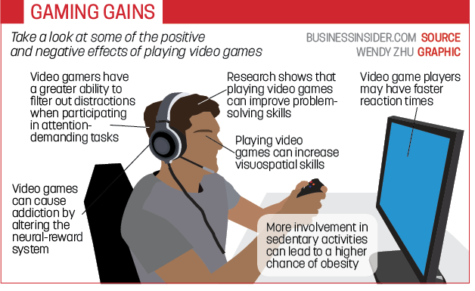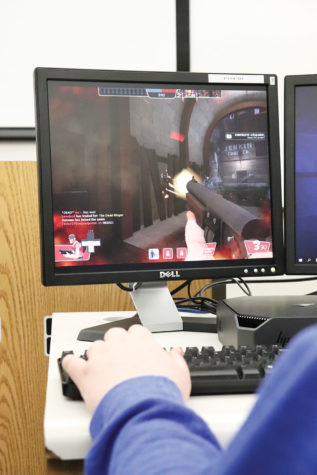As issues like gun violence take the United States by storm, people often search for something to account for this constant violence. Over the years, many people have attempted to link teen aggression with violent video games; however, according to a recent study published by the Oxford Internet Institute at Oxford University, there is no connection between the two. In fact, video games, under certain circumstances, can be more beneficial than harmful to teenagers.
 For Austin Prader, eSports Club president and junior, video games have had an immensely positive effect on his life.
For Austin Prader, eSports Club president and junior, video games have had an immensely positive effect on his life.
“I like to think of (playing video games) as an easy way to get involved in the community,” Prader said. “When gaming was first being introduced, it was mostly just single-player, but now with the integration of multiplayer, most games are almost impossible to play without meeting other people, so that’s an important social aspect of it.”

Prader said he does not believe video games promote violence and said he thinks they promote the exact opposite: a sense of connection and friendship.
“A lot of my friends and a lot of the people I know actually come from (playing video games), and I think a lot of my leadership skills come from leading games or trying to be in charge of a team, so it really means a lot more than people imagine,” Prader said.
Moreover, Brendan Lewis, member of eSports Club and senior, said video games have the ability to not only connect people in a community but also people around the world.
“I’ve met some people who live in different parts of the (United States), and I’ve become friends with them through playing video games,” Lewis said. “It’s a really good medium in which you can play with people you may not be able to see on a daily basis.”
Dylan Gentilcore, eSports Club sponsor and English teacher, said he also agrees that video games are often more helpful than detrimental.
“I’ve always viewed video games as being an extremely beneficial hobby for one to have,” Gentilcore said. “Like anything else, it can be detrimental in excess, but I think if you are mindful of your video game usage, if you have structures and boundaries put in place, (playing video games) can really lead to students developing a diverse mindset and skill set.”
According to Gentilcore, playing video games can also provide teenagers with valuable skills and knowledge that could be applicable to the real world or academics.
“Video games are developed on a global scale, and international companies make some of the greatest franchises around, so they insert parts of their own culture, folklore and customs into there, and you can really experience that in a new way as a teenager in Indiana,” Gentilcore said. “You can also develop basic hand-eye coordination and memorization. A student (who plays video games) gets used to memorizing the patterns in a video game of a boss fight or the layout of a map. That can really translate directly to the patterns that they’re seeing in equations or geography or anything like that.”
Although there can be several benefits of playing video games, it is important to consider the fact that it can also become harmful and develop addictions. Nevertheless, Gentilcore said having a strong support system is key to preventing that addiction.
“If you are a teenager who doesn’t have adults in your life who have conversations with you and are engaging in what you’re doing, interacting with you, and if you use video games as sort of a dangerous addiction form of escape, that can be very detrimental,” Gentilcore said. “You can get addicted to (playing video games) just like any other activity or substance, and you can start to lose priorities in your life. You can cut yourself off socially, and it can be like a disconnect from reality. ”
Prader also said people need to remember that video games are only virtual.
When it comes to the idea that video games lead to violence in real life, Gentilcore, Lewis and Prader said they do not believe there is any connection between violent video games and aggressive behavior in teenagers.
According to Prader, it may be common to hear about gamers getting angry, but he said this anger does not always translate directly to violence.
Gentilcore also said he believes blaming teenage aggression on violent video games is usually a scapegoating situation.
“If you look at the history of the way we approach these taboo topics, there’s always going to be something we associate with youth aggression,” Gentilcore said. “Before video games, it was comic books. Before comic books, it was rock and roll. I’m really not sure why exactly we’re pushing all the blame onto this one medium.”
Gentilcore said he believes the next step society should take is to remove the stigma surrounding video gamers.
“I think it’s important that we destigmatize video games not only in terms of their violence, but also with the general lifestyle we associate with gamers,” Gentilcore said. “Really, a lot of (video gaming) is a way to socialize and destress, and that’s very important, especially at CHS, where we have a lot of stressed students who are just trying to find people they can unwind with.”

































![AI in films like "The Brutalist" is convenient, but shouldn’t take priority [opinion]](https://hilite.org/wp-content/uploads/2025/02/catherine-cover-1200x471.jpg)








































![Review: “The Immortal Soul Salvage Yard:” A criminally underrated poetry collection [MUSE]](https://hilite.org/wp-content/uploads/2025/03/71cju6TvqmL._AC_UF10001000_QL80_.jpg)
![Review: "Dog Man" is Unapologetically Chaotic [MUSE]](https://hilite.org/wp-content/uploads/2025/03/dogman-1200x700.jpg)
![Review: "Ne Zha 2": The WeChat family reunion I didn’t know I needed [MUSE]](https://hilite.org/wp-content/uploads/2025/03/unnamed-4.png)
![Review in Print: Maripaz Villar brings a delightfully unique style to the world of WEBTOON [MUSE]](https://hilite.org/wp-content/uploads/2023/12/maripazcover-1200x960.jpg)
![Review: “The Sword of Kaigen” is a masterpiece [MUSE]](https://hilite.org/wp-content/uploads/2023/11/Screenshot-2023-11-26-201051.png)
![Review: Gateron Oil Kings, great linear switches, okay price [MUSE]](https://hilite.org/wp-content/uploads/2023/11/Screenshot-2023-11-26-200553.png)
![Review: “A Haunting in Venice” is a significant improvement from other Agatha Christie adaptations [MUSE]](https://hilite.org/wp-content/uploads/2023/11/e7ee2938a6d422669771bce6d8088521.jpg)
![Review: A Thanksgiving story from elementary school, still just as interesting [MUSE]](https://hilite.org/wp-content/uploads/2023/11/Screenshot-2023-11-26-195514-987x1200.png)
![Review: "When I Fly Towards You", cute, uplifting youth drama [MUSE]](https://hilite.org/wp-content/uploads/2023/09/When-I-Fly-Towards-You-Chinese-drama.png)
![Postcards from Muse: Hawaii Travel Diary [MUSE]](https://hilite.org/wp-content/uploads/2023/09/My-project-1-1200x1200.jpg)
![Review: "Ladybug & Cat Noir: The Movie," departure from original show [MUSE]](https://hilite.org/wp-content/uploads/2023/09/Ladybug__Cat_Noir_-_The_Movie_poster.jpg)
![Review in Print: "Hidden Love" is the cute, uplifting drama everyone needs [MUSE]](https://hilite.org/wp-content/uploads/2023/09/hiddenlovecover-e1693597208225-1030x1200.png)
![Review in Print: "Heartstopper" is the heartwarming queer romance we all need [MUSE]](https://hilite.org/wp-content/uploads/2023/08/museheartstoppercover-1200x654.png)




